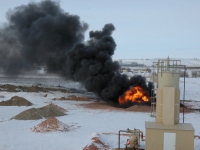North Dakota Shale Boom Displaces Tribal Residents

Heather Youngbird and Crystal Deegan used to live in a trailer at the Prairie Winds Mobile Home Park in the Fort Berthold Indian Reservation in North Dakota. Last week Leroy Olsen, their landlord, removed their front door and cut off the electricity and the propane supply. The reason? New homes to be constructed for out of town oil workers coming to take part in the shale exploration boom.
"This oil boom has divided the Mandan, Hidatsa and Arikara people and pitted them against each other in a negative way," says Kandi Mossett, a tribal member and organizer with the Indigenous Environmental Network.
In 2010, WPX Energy of Oklahoma paid $925 million for the right to explore for oil on the 86,000 acres of the Fort Berthold Indian Reservation. The company plans to squeeze oil out of shale, the most abundant form of sedimentary rock. Until recently such exploration was prohibitively expensive, but with the evolution of technology and the rise in the price of oil, many rural communities from England to the Ukraine, from Argentina to North Dakota, have become targets for the shale oil boom.
Another company profiting from the Bakken boom, which has been described as the biggest oil find in North America in four decades with an estimated 4.3 billion barrels of recoverable oil, is Continental Resources, also from Oklahoma.
Fort Berthold - the center of the oil boom - has long suffered from crumbling roads and the lack of good housing and proper sewage facilities on the reservation. The companies plan to invest in housing and infrastructure for their workers and plants, but not for local residents.
"Right now, anything that's available that has water and sewer on it is very attractive to anybody that's trying to continue to grow their business," says John Reese, the CEO of the United Prairie Cooperative company, which has taken over the trailer park.
"We were not even given a formal 30 day eviction notice and now that we have been kicked out of our home we are currently homeless," said Heather Youngbird. The remaining residents of Prairie Winds Mobile Home Park have been told that they had to leave their trailers by May 1, but the eviction date has now been postponed until August 31.
More trouble is expected for the tribal community: Environmental groups note that residents may also soon see problems with their drinking water. "Information posted hydraulic fracturing fluid chemicals on the FracFocus web site indicates that Bakken Shale oil wells may contain toxic chemicals such as hydrotreated light distillate, methanol, ethylene glycol, 2-butoxyethanol (2-BE), phosphonium, tetrakis(hydroxymethyl)-sulfate (aka phosphonic acid), acetic acid, ethanol, and napthlene," writes EarthWorks, a Washington DC based group.
Then there is the air pollution: the oil companies are not even bothering to capture the natural gas that is generated by the drilling, partly because there are no state regulations to force them to and partly because it is expensive. Instead the gas is being "flared" or burnt off, the same way Shell does in the Niger delta with similar environmental consequences.
"Across western North Dakota, hundreds of fires rise above fields of wheat and sunflowers and bales of hay. At night, they illuminate the prairie skies like giant fireflies," wrote Clifford Krauss in the New York Times last September. "Every day, more than 100 million cubic feet of natural gas is flared this way - enough energy to heat half a million homes for a day."
Perhaps the greatest irony is that North Dakota has the greatest wind resource of almost any state in the country, says Mossett. She says that North Dakota could supply 1.2 trillion kilowatt-hours (kWh) of annual electricity.
- 183 Environment